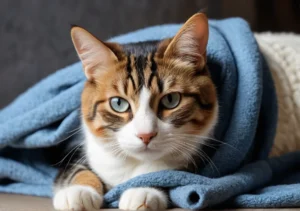Have you ever wondered why cats can sometimes be mean to humans? What causes these seemingly cold-hearted creatures to act out in such a way? Let’s explore the reasons behind why cats exhibit this behavior.
Natural Instincts
Cats have natural instincts that can sometimes make them seem mean to humans. One key instinct is their hunting behavior. Cats are predatory animals, and their instincts drive them to hunt and catch prey. This can manifest in behaviors like pouncing, scratching, and biting, which may be directed towards their human companions during playtime. While these actions are not intended to be malicious, they can come across as aggressive or mean.
Additionally, cats are territorial animals. They have a strong need to establish and defend their territory, which can include their living space and their human family. When a cat perceives a threat to their territory, they may exhibit protective behaviors such as hissing, swatting, or even avoidance of their human. This can make them appear standoffish or mean, even though they are simply acting on their instinct to protect what is theirs.
Understanding these natural instincts can help cat owners interpret their behavior and respond appropriately. By providing enriching playtime and reserving a safe space for the cat, owners can help satisfy their feline friend’s instincts in a positive way, reducing the likelihood of mean behavior.
Lack of Socialization
A lack of socialization can also contribute to a cat being mean towards their human companions. Socialization is the process by which a cat learns to interact with other animals, including humans, during their early development. Cats that have not been properly socialized may struggle to trust humans and may exhibit fearful or defensive behaviors.
Inadequate socialization can lead to anxiety and stress in cats, which may manifest as aggression or aloofness towards their owners. This can make the cat appear mean or unfriendly, when in reality, they are simply reacting to unfamiliar or threatening situations in the only way they know how.
To help a poorly socialized cat become more comfortable around humans, it is important to create a safe and positive environment for them to build trust. Patience, positive reinforcement, and gentle interactions can all help the cat feel more at ease and less likely to exhibit mean behavior towards their human companions. Remember, socialization is key to fostering a positive relationship with your feline friend.
Stress and Anxiety
Stress and anxiety can contribute to a cat’s mean behavior towards humans. Just like people, cats can feel overwhelmed or anxious in certain situations. Common stressors for cats include changes in their environment, loud noises, new pets, or even changes in their routine. When a cat is stressed or anxious, they may lash out at their human companions as a way to cope with these emotions. It’s essential to create a calm and secure environment for your cat to help reduce their stress levels and prevent aggressive behavior. Providing enrichment activities, like interactive toys and scratching posts, can also help alleviate stress and provide an outlet for your cat’s energy. Remember, a happy and relaxed cat is less likely to be mean towards you.
Territorial Behavior
Cats are known for their territorial instincts, which can influence their interactions with humans. Cats have a strong need for personal space and can become aggressive if they feel their territory is being invaded. This territorial behavior is rooted in their natural instincts to protect their resources and ensure their safety. It’s crucial to respect your cat’s boundaries and provide them with their own space where they feel safe and secure. Avoid forcing interactions or invading their personal space, as this can trigger mean behavior. Additionally, providing multiple litter boxes and food/water stations in different areas of your home can help prevent territorial disputes between cats and reduce aggressive behavior towards humans.
Additional Insight: Signs of Stress
When trying to understand why your cat may be mean towards you, it’s crucial to recognize the signs of stress in cats. Some common signs of stress in cats include excessive grooming, hiding, dilated pupils, changes in appetite, and aggressive behavior. By being aware of these signs, you can better understand your cat’s emotional state and take steps to alleviate their stress and prevent mean behavior. Remember, a healthy and happy cat is more likely to form positive relationships with their human companions.
Fear and Trust Issues
Cats may exhibit mean behavior towards humans due to fear and trust issues. Felines are naturally cautious creatures and can become aggressive when they feel threatened or scared. Past negative experiences, such as trauma or abuse, can also contribute to their mistrust of humans. It’s essential to approach cats with patience and understanding, giving them space to build trust at their own pace. Creating a safe and secure environment for your cat can help alleviate their fear and combat their mean tendencies. Remember, a little compassion goes a long way in building a strong bond with your feline friend.
Communication Challenges
Miscommunication between cats and humans can lead to perceived meanness from our furry companions. Cats have their own unique way of communicating through body language, vocalizations, and behavior. Failure to understand these signals can result in misunderstandings and frustration on both ends. For example, a cat may lash out if they feel cornered or overwhelmed, even though they are simply trying to communicate their discomfort. To bridge this communication gap, take the time to learn your cat’s cues and respond to them appropriately. Establishing clear boundaries and positive reinforcement can help improve the relationship between you and your cat, fostering a deeper understanding and connection.
Tips for Better Communication with Your Cat:
- Pay attention to body language: Cats use their body to convey emotions. Ears pinned back, tail flicking, or dilated pupils can indicate stress or aggression.
- Respect your cat’s personal space: Allow your cat to approach you on their terms and avoid forcing interactions they’re not comfortable with.
- Use positive reinforcement: Reward good behavior with treats or affection to reinforce positive communication with your cat.
- Seek professional help: If your cat’s mean behavior persists, consider consulting a veterinarian or animal behaviorist for guidance. Remember, effective communication is key in strengthening your bond with your feline companion.
Past Trauma
Cats can be mean towards humans due to past trauma or negative experiences. If a cat has been mistreated, neglected, or had a traumatic encounter with humans in the past, it can impact their behavior. These experiences can make them fearful, defensive, or aggressive towards people, even those trying to show them affection.
Understanding a cat’s background is crucial in addressing their behavior. Patience, empathy, and consistent positive interactions can help build trust and gradually improve the relationship. Creating a safe and reassuring environment for the cat to feel secure is essential. Slowly introducing them to new experiences and people can also help them overcome their past trauma and learn to trust again.
Ways to Improve the Relationship
Building a strong bond with a cat is key to improving their behavior towards humans. Spend quality time with your cat, engaging in interactive play, grooming, and providing them with attention and affection. Positive reinforcement, such as treats and praise, can also reinforce good behavior and strengthen the bond between you and your cat.
Creating a routine and providing a stimulating environment with toys, scratching posts, and perches can keep your cat mentally and physically active. Understanding your cat’s body language and respecting their boundaries is crucial in fostering a positive relationship. Communicate with your cat through gentle gestures and vocal cues to establish trust and mutual understanding.
Strategies to Improve the Relationship:
- Consistency: Stick to a consistent routine to create a sense of security for your cat.
- Patience: Building trust takes time, so be patient and understanding with your cat.
- Respect: Recognize and respect your cat’s individual personality and preferences.
- Training: Use positive reinforcement training techniques to encourage good behavior.
- Consultation: Seek advice from a veterinarian or animal behaviorist for additional support.
By implementing these strategies and tips, you can gradually improve the relationship with your cat and help them become more affectionate and friendly towards humans.
Interesting Facts about Cat Behavior
Cats have specific ways of communicating : Ever noticed your cat’s unique meows or body language? Cats have a full repertoire of communication methods to express their needs, feelings, and even annoyance. Understanding these cues can help decipher why cats may seem mean at times.
Cats are territorial creatures : Felines are known for their strong sense of territory. They can become defensive or aggressive when they feel their space is being invaded. This territorial nature can lead to behaviors perceived as mean towards humans, especially if the cat feels threatened or stressed.
Cats are independent beings : Unlike dogs, cats are more solitary creatures by nature. They may not always crave human interaction or affection like a canine companion would. This independence can sometimes be mistaken as aloofness or even meanness, when in reality, cats simply have different social needs.
Cats are sensitive to changes : Cats are creatures of habit, and even small changes in their environment can trigger stress or anxiety. This can manifest in behavior that comes across as mean, as cats struggle to cope with disruptions to their routine or space.
Unique Insight : Cats may exhibit mean behavior as a form of self-preservation. In the wild, showing aggression can help fend off potential threats or establish dominance. While domestic cats don’t face the same dangers, this instinctual behavior can still emerge in certain situations.
Remember, each cat is an individual with its own personality and preferences. By understanding these fascinating facts about cat behavior, you can better comprehend why cats may sometimes appear mean towards humans.
Alex, a passionate animal lover, has experience in training and understanding animal behavior. As a proud pet parent to two dogs and three cats, he founded AnimalReport.net to share insights from animal experts and expand his knowledge of the animal kingdom.




